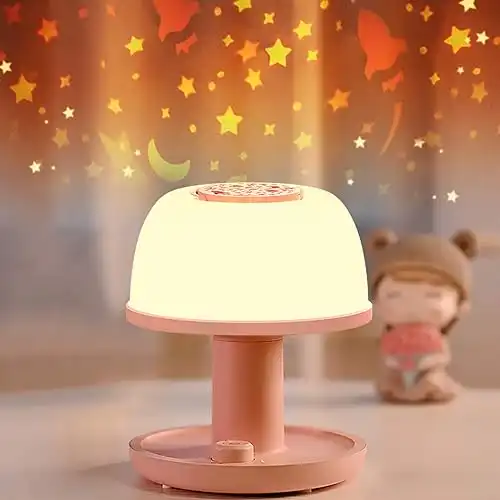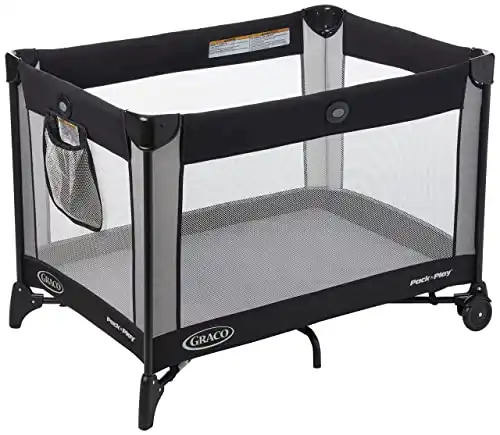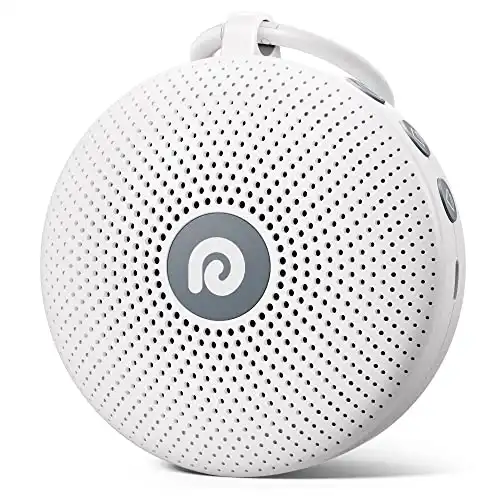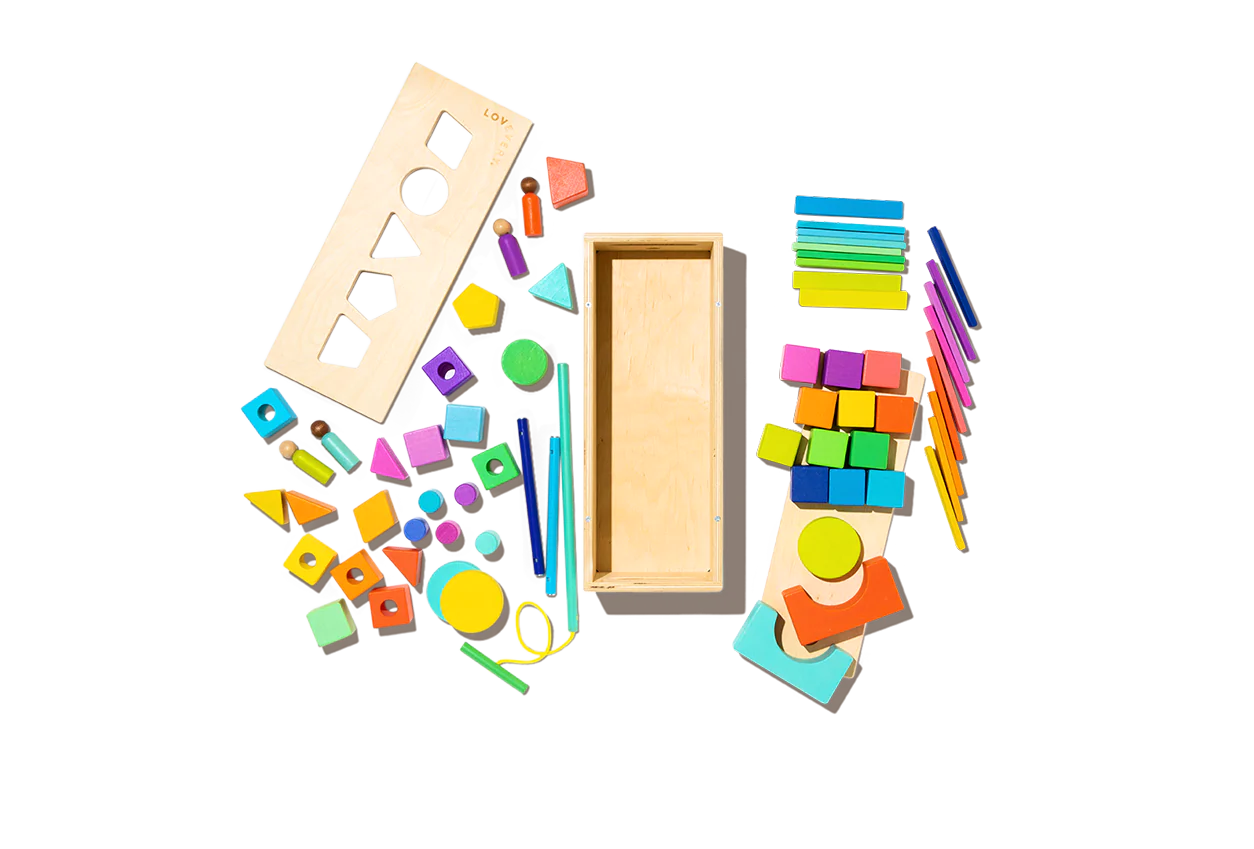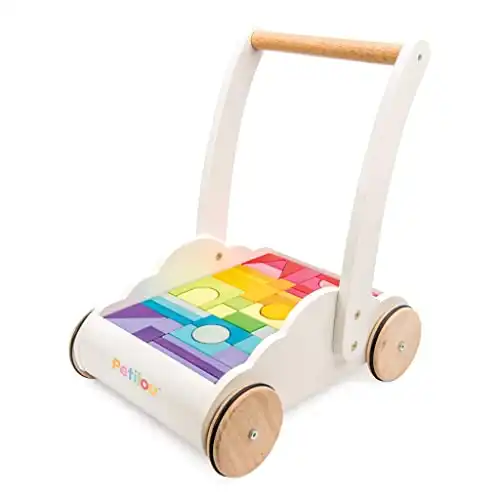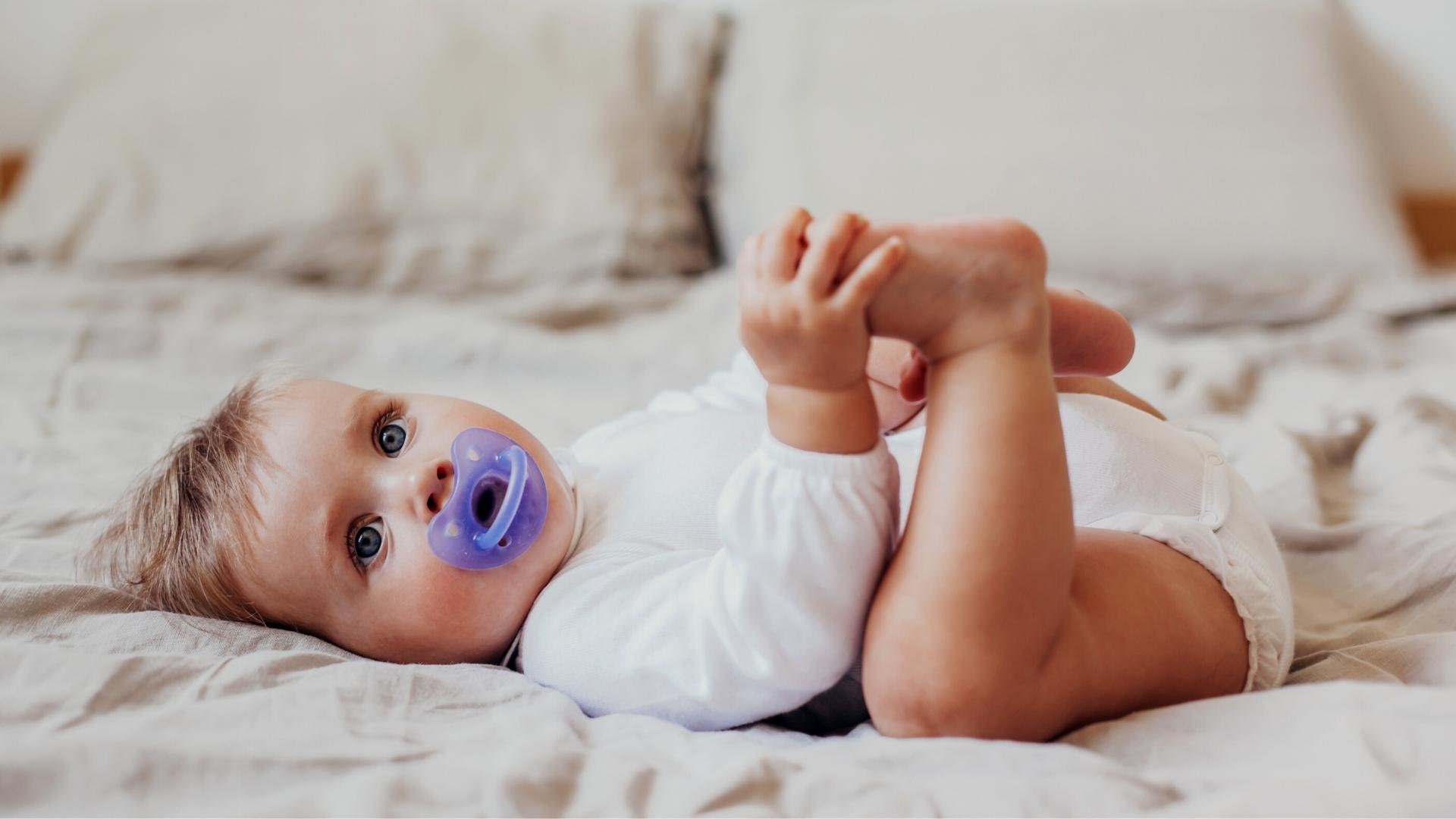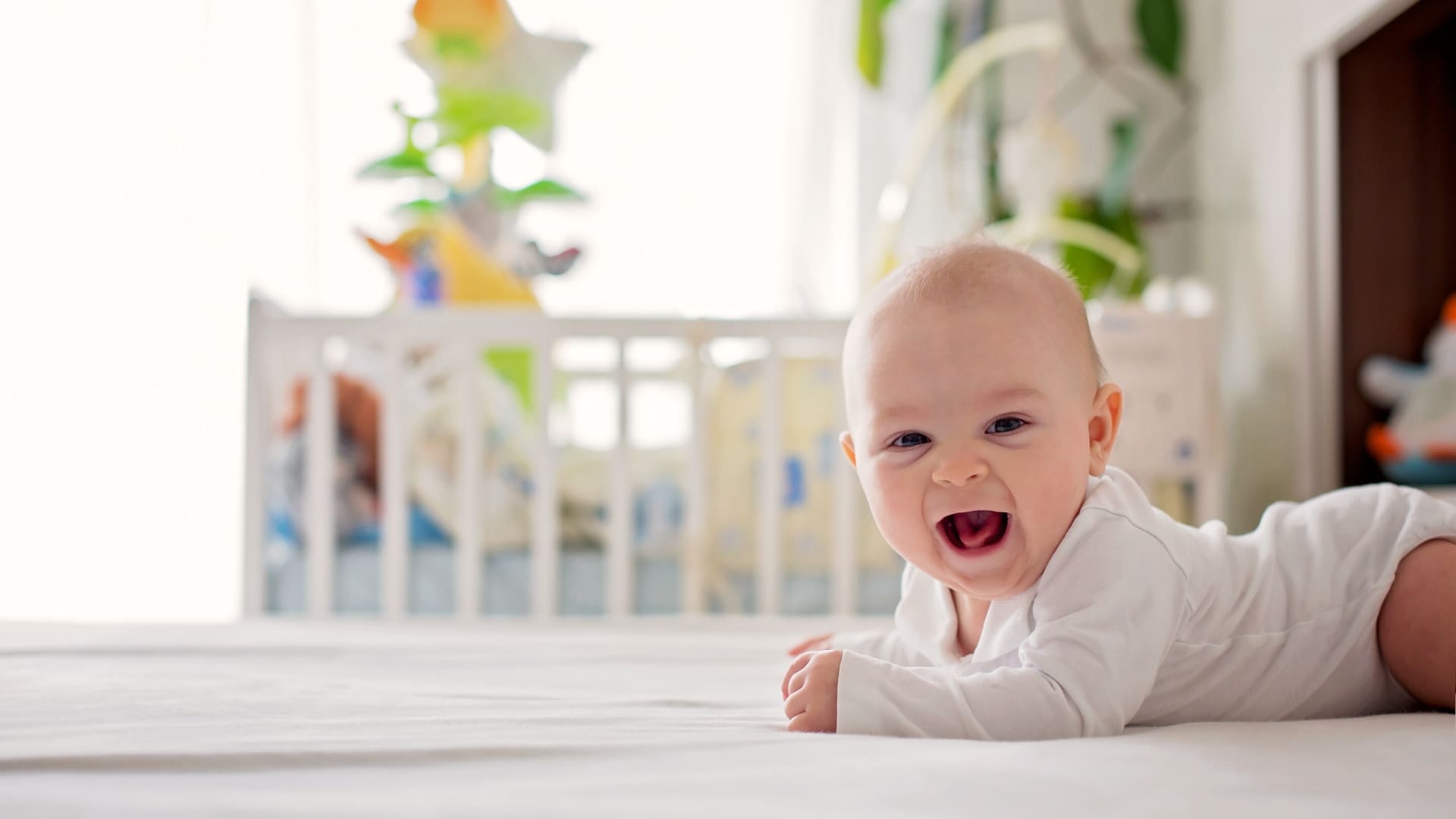Is your child suddenly fighting sleep? Being fussy? Struggling to settle? The 16 month sleep regression has arrived. Here’s what that means, and what exhausted parents need to know to get through it with healthy sleep habits intact.
What Is The 16 Month Sleep Regression?
The 16 month sleep regression is marked by a short period of time in which your toddler’s sleep pattern becomes disrupted by them fighting sleep, waking more often and struggling to fall back to sleep, usually as a result of developmental leaps.
How Long Does The 16 Month Sleep Regression Last?
If your child experiences it, the 16 month sleep regression, commonly lasts between 2 and 6 weeks depending on the trigger.
16 Month Sleep Regression Signs
If you suspect your little one is experiencing a 16 month sleep regression, here are some of the signs that will confirm your suspicions:
- During the 16 month old sleep regression, there is an increase in the number of nighttime wakings.
- Your little one will struggle to fall asleep after they wake up at night.
- They will resist their established consistent bedtime routine.
- More often than not, your child’s sleep cycle will fall aside and they will require more daytime sleep due to a lack of sleep at night.
- Your little one will struggle to fall asleep when put to bed and will be fighting naps.
- Your child will try to get out of bed more often (especially if they have recently transitioned to a toddler bed from a crib).
- Your little one is crying more and becoming agitated when they wake. Because a sleep regression results in less deep refreshing sleep your little one may wake in a grumpy mood and be rather fussy and unsettled.
- Your little one is increasingly interested in their surroundings. The world is a wondrous place and as with learning a new skill, developing an interest in their surroundings means your little one’s brain is being very stimulated and may struggle to wind down for sleep.
- They are more clingy. Separation anxiety can kick in at any age. This can result in them being more clingy and not liking being left alone especially when it is time to sleep.
So, if you are nodding your head in agreement whilst reading this list… Then your little one is almost certainly experiencing a sleep regression.
Looking to get your little one to sleep quickly and effortlessly through a healthy nighttime routine? Check out my Bedtime and Nap Cheat Sheet and master the art of making daytime naps and bedtimes as seamless as possible.
A bedtime & nap cheat sheet so good your little one will ask you to put them to bed...
Laura Williams "This is a life saver! I'm so glad I downloaded your bedtime & nap cheat sheet. My little one actually asked me to put him to bed last night! Unbelievable! Thank you so much!"
Click Here For The FREE Cheat Sheet
Causes Of The 16 Month Sleep Regression
There are a variety of causes of the 16 month sleep regression. But if I had to narrow them down, these are the top causes of sleep regressions that every parent should be aware of.
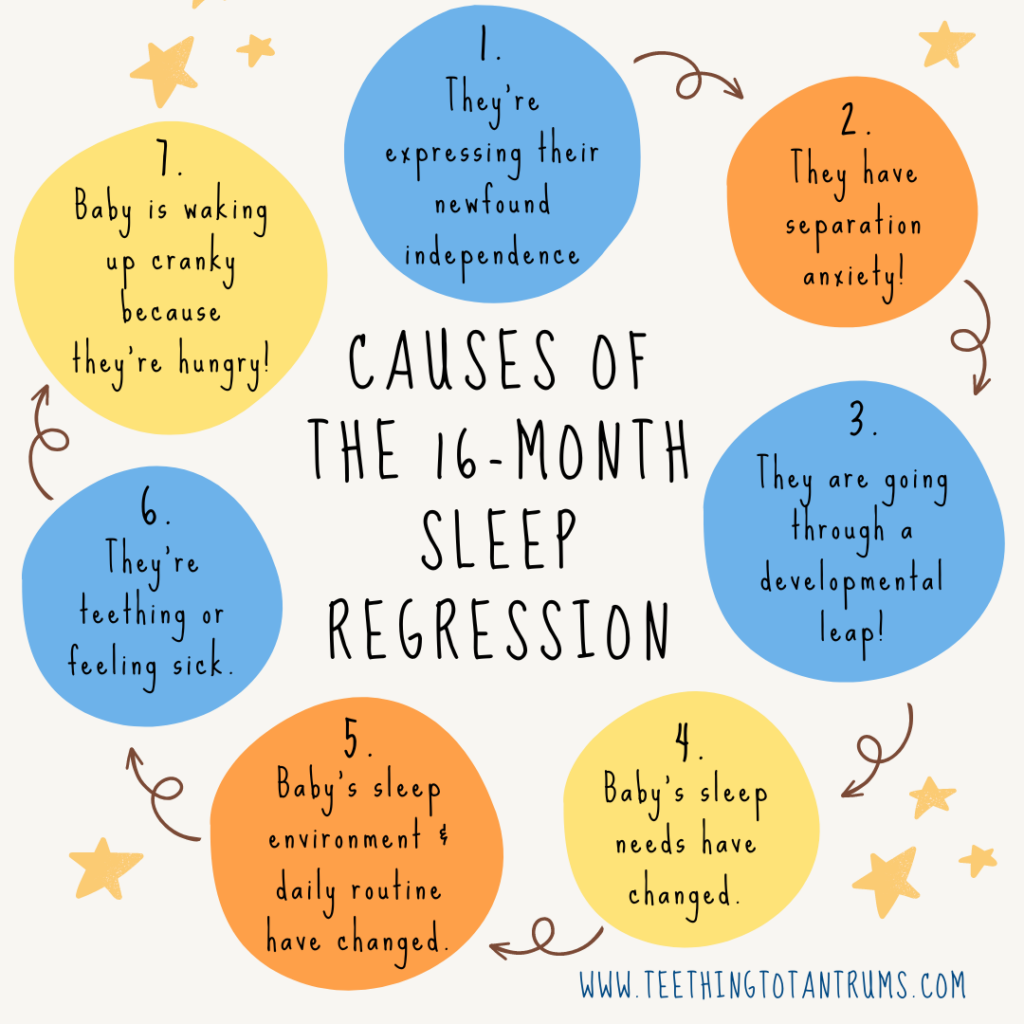
1. Newfound Independence
For some toddlers, their newfound desire for independence around the 16-18 month mark makes them want to push boundaries and resist established routines.
Sadly for us… this includes resisting naps and bedtimes.
In addition, toddlers are loving their growing ability to interact with the world around them.
This can mean that they find it hard to wind down at the end of the day, making falling asleep quite tricky.
2. Separation Anxiety
Separation anxiety is also very common at this age and will make it difficult for your little one to fall asleep or to become distressed when they wake up at night and discover you’re not with them.
3. Developmental Leaps
A lot is going on physically at this age with your little one perfecting the art of walking, climbing and talking. There is a lot going on cognitively as well as they become increasingly aware of the world around them and their place in it.
All that extra brain and body activity can easily disrupt their sleep.
4. Their Sleep Needs Are Changing
During toddlerhood, your little one’s sleep patterns will fluctuate with their development.
This means that on some days your toddler may need to go to bed a little later and wake up later. Or they’ll need to go to bed sooner and wake up earlier.
They may even start nap transitioning from 2 short naps to 1 long nap time.
This is a natural part of growing up and you will have to make these sleep adjustments as your toddler grows.
However, if not managed properly, your toddler can easily fall into the 16 month old sleep regression.
5. Their Routine And Environment Has Changed
Moving house, going on holiday or visiting family overnight can all trigger a sleep regression.
And any major changes in routine could also upset an established day sleep schedule such as starting daycare, parents returning to work or the primary caregiver changing.
6. They’re Teething Or Sick
Your toddler’s first molars may start to erupt at this age. If your little one is experiencing pain due to teething their sleep is very likely to be disrupted for a short while and although this is not a true sleep regression in itself, it may trigger one.
Investing in a natural teething toy can help soothe your baby resulting in helping them sleep better!
Like teething, illness may cause a sleep disruption for a short period of time and although this is not a true sleep regression, sickness can trigger a brief one as your little one may have been used to you responding to every cry or unsettled sleep while they were unwell.
7. Hunger
With all the increased physical activity that your 16 month old is now capable of they may need more calories to keep them going.
This can result in them waking more often due to hunger so you need to keep an eye on their calorie intake during the day (especially at the end of the day).
How Much Sleep Do 16 Month Olds Need?
Your 16 month old should be having between 12-14 hours of sleep in a 24-hour period with the bulk of this being taken at night and the remainder over 1 or 2 naps.
Tips To Get Through The 16 Month Sleep Regression
Sleep regressions are tough, there is no question about that. However, there are things you can do to help you and your child get through this phase and come out the other side with your healthy sleep habits intact.
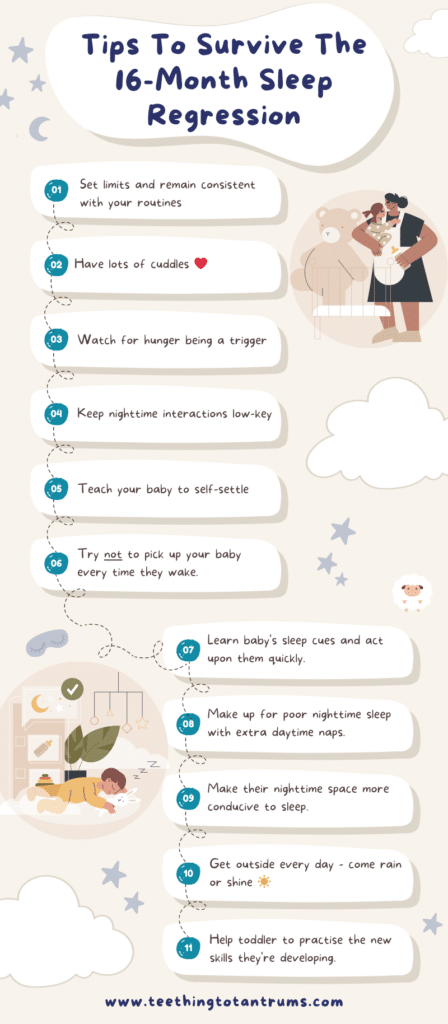
1. Set Limits And Stay Consistent With Routines
As your toddler becomes more independent, they will need you to set some consistent boundaries in order to help them feel better able to cope.
Realising they are capable of doing so many new things can be very overwhelming for a child.
So, make sure you have a consistent sleep schedule in place during the day to help your toddler learn how to respond to established routines for naps and bedtimes.
If you have to cancel a few plans over the coming weeks to ensure you’re at home for naps and bedtime, it will be worth it in the long run.
REMEMBER: Having a calm and consistent evening routine for your toddler will not necessarily stop a sleep regression… But it will prepare your toddler for sleep and give them clear cues that bedtime is coming up and that it is a non-negotiable.
2. Have Lots Of Cuddles
Sleep regressions can sometimes make your little one feel less secure. Offering extra cuddles and snuggle time can help reassure them as they navigate this tricky phase.
3. Watch For Hunger Being A Nighttime Waking Trigger
It is very tempting to feed your baby in order to get them back to sleep… however, this is not a habit you want to continue.
Offering mid-morning and mid-afternoon snacks can help as well as a milky drink before bed (a bottle or cup of formula or breastmilk, depending on your preference and weaning stage).
PS: The wonderful Edwena at My Little Eater has some great Toddler Bedtime Snacks to try, so be sure to check her out too.
4. Keep Nighttime Interactions Low-Key
If your little one wakes at night then it’s super important to keep your interactions low-key. Have the lights down low and do not chat to them. A night light is a great investment as it stops you from having to turn on a light when visiting them at night.
Finding the right night light for your child can be quite a task. You want something safe, comforting, and practical. The Cozy Starry Night Light ticks these boxes, with eye-friendly warm lighting and an easy-to-use dimmer.
Its gentle glow makes it the best night light for feeding baby, diaper changes, or comforting your little one back to sleep.
As your baby grows the Cozy Starry Night Light's starry sky projection can provide comfort and gentle quiet time stimulation. Its soft lighting ensures a dreamy, peaceful environment, supporting your baby’s natural sleep cycle.
It really is a fantastic nightlight (at a very reasonable price!)
- Eye-friendly warm lighting with adjustable brightness.
- Includes a timer function for convenience.
- Projects a starry sky that is soothing for little ones.
- Rechargeable battery, so it's very portable.
- A USB adapter is not included for charging.
- The star projector is static without motion (however, this is ideal for very young babies and toddlers).
- Battery life varies based on the brightness settings.
5. Teach Your Little One To Self-Settle
If you have not done so already, try and teach your little one to self-settle. Encourage your baby to spend short periods of time alone in a playpen or their crib during awake times. But keep popping back to check on them so that they know that you will return.
This will teach them that they’re safe and ok to be alone and that you will return in time. It will also help your little one to learn independent sleep skills and as a result, they will go to sleep alone at night much easier as they understand that you will be back in the morning.
I personally prefer the Graco Play Yard for independent toddler play:
This playpen takes very little time to set up and putting it away is a breeze thanks to its clever design. Small but perfectly suited for indoor and outdoor use, this play pen will keep baby safe no matter where you are!
6. Try Not To Pick Them Up Every Time They Wake
It is very easy to fall into bad habits during a sleep regression so if your little one is waking more at night try leaving them to fuss for a short time when they wake, as they may just fall back to sleep without you having to go to them.
If however, they start to become distressed, you should go to them.
7. Learn Your Little Ones Sleep Cues And Act On Them
During a sleep regression, your little one may need more sleep during the day to make up for broken nights.
Increased physical activity and abilities can make your little one more tired than usual for a while. As they adjust to their new skills you will need to act upon sleep cues to avoid them becoming overtired.
Common sleep cues include: yawning, rubbing eyes, clenched hands, glazed eyes, being distracted, pulling ears, being withdrawm and becoming less social.
8. Make Up For Poor Nighttime Sleep With Extra Naps During The Day
Let your little one sleep whenever they need to during the day to avoid them becoming overtired. Knowing how much sleep your baby needs in a 24-hour period and then calculating how much daytime sleep they need will help enormously too.
Never try and keep your little one awake during the day in the hope they will sleep better at night. An overtired toddler is not going to go to bed peacefully or quietly.
Their bodies will be stressed and full of cortisol and adrenaline… And this is not ideal when getting ready for bed because your little one will be hyper instead.
REMEMBER: Your child should not be in bed any later than 8pm to ensure your toddler gets enough sleep to support healthy brain development and growth as well as physical development.
9. Make Their Sleep Space More Conducive To Sleep
Now your little one getting older they will be more easily woken by sleep distractions and noise. So, darken the bedroom using blackout blinds and use a nightlight.
During a 16 month sleep regression your little one needs to be sleeping in a calm, dimly lit room. Using a white noise machine can eliminate background noise from disturbing their sleep too.
They will help to ensure that sudden changes in noise will have less of an impact on your sleeping baby.
White noise machines are a game-changer for your little one's sleep and having one that plays all night is a must. With a long-lasting battery, this compact and stylish white noise machine contains 21 non-stop relaxing noises, which will lull your little one to sleep night after night, no matter where you are!
10. Get Outside Everyday
Getting outside every day is also incredibly important for your toddler’s circadian rhythm and will definitely help them sleep better and reduce the impact of the 16 month old sleep regression.
Fresh air and natural light during awake times are crucial for healthy sleep and it has been proven that spending time outdoors each day benefits toddler sleep.
11. Help Your Little One Practice New Skills
It is important that you give your toddler plenty of opportunity to practice any new skills during wake times so that they are not desperate to do so when they should be sleeping.
Provide them with toys to help them walk, opportunities to learn to climb safely, play with construction toys such as building blocks and try simple puzzles too.
Read lots of books to encourage speech and cognitive development.
Possibly the most comprehensive wooden block set ever created!
This beautiful and brilliantly designed wood block set promotes spatial, language, and problem-solving skills through bright and solid wood building blocks, planks, shapes, people, magnetic wheels and dowels with a toggle string. All are safely kept in a wooden storage box and a cotton drawstring bag for storage at the end of a busy day!
Another toy staple is the baby walker and there are a lot out there to choose from. I really like this one from Le Toy Van. It is eco friendly, safe and sturdy and will be a firm favourite with your toddler before, during and after they learn to walk independently!
Looking After Yourself During A Sleep Regression
As parents, we often forget to look after ourselves. Our children are our priority, and everything else falls into second place.
However, insufficient sleep will undoubtedly make us short-tempered and cranky… And at the best of times, looking after a toddler requires lots of energy and patience.
So to help yourself through the 16 month old sleep regression remember to:
- Enlist some help if you are able, by getting your partner to share the evening routine and help to deal with night wakings.
- Take a break during the day to avoid parenting burnout. Leave your toddler in the care of a trusted friend or family member for a couple of hours and do something for yourself.
- Make time for small moments that bring you joy. Enjoy that cup of fancy coffee, take a short 10-minute walk around the block, savour that piece of chocolate and plan a bubble bath in the evening.
Don’t be too harsh on yourself if you are struggling or feeling irritated. Sleep disruption and parenting go hand in hand…
But you can navigate these sleep regressions if you stick to established routines, understand what is going on in your toddler’s development and hold on to the fact that this is just a phase that will pass if handled correctly.

Frequently Asked Questions About The 16 Month Sleep Regression
Looking for more information about the 16 month sleep regression? Check out the most commonly asked questions here.
Is There Really A Sleep Regression At 16 Months?
While there are certain ages at which sleep regressions are more common… the truth is that a sleep regression can happen at any time.
Why Is My 16 Month Old Suddenly Waking At Night?
If your 16 month old has been sleeping beautifully and suddenly starts waking at night this may be due to a number of triggers including teething or achieving a developmental milestone, starting daycare or changing sleep needs.
While you should always rule out any illness that may be affecting your little one, if all is well then you should deal with your little one’s nighttime waking and or nap resistance as a sleep regression and follow the tips listed above.
How Will I Know When The 16 Month Sleep Regression Is Over?
When your toddler settles back into a settled sleep routine consisting of regular daytime naps and bedtime with little to no waking at night, you can safely say that the regression has passed.
Is There A Developmental Leap At 16 Months?
At 16 months of age, your little one is likely to experience the following developmental leaps.
- Taking their first independent steps (if they have not already done so)
- Increasing their vocabulary
- Learning to climb stairs
- First molars may start to come through
- Increased comprehension and ability to identify objects.
With all this activity going on in your little one’s development they may easily find it hard to wind down and fall asleep or stay asleep thus triggering a sleep regression.
Can Toddler Night Terrors Trigger A Sleep Regression?
Night terrors are usually a result of your little one being overtired or suffering from separation anxiety.
This can in itself trigger a sleep regression. It is, therefore, important that your toddler is getting to bed at an appropriate time and that you are addressing any separation anxiety issues they might be having.
Are the 16 Month Sleep Regression And 18-Month Sleep Regression The Same?
18 months of age is considered to be one of the more common ages at which a sleep regression may occur. However, a sleep regression can happen at any age.
If your toddler experiences a 16 month sleep regression, it does not mean that they will also experience an 18 month sleep regression.
Should I Let My 16-Month-Old Cry It Out?
No. Letting your 16 month old cry it out is not going to cure a sleep regression or make it pass any more quickly.
Sleep regressions are challenging and you will need to be patient and help your little one through this tricky phase by following the guidelines outlined in this post.
Can You Do Sleep Training When Your Child Is Going Through A 16 Month Sleep Regression?
I would NOT recommend doing any sleep training during a 16-month-old sleep regression unless the regression transfers into a permanent change in sleeping habits.
There is too much going on to change more of your baby’s sleep environment, so just follow the tips I have outlined above and you should get through the regression without undoing your hard work of creating healthy sleep habits.
Once you’re back on track you can start to assess sleep time and use sleep training methods to help your toddler get more night sleep with healthy sleep associations.
How To Navigate 16 Month Sleep Regression And Separation Anxiety?
Separation anxiety is a common cause of toddler sleep regressions but luckily there are things you can do to help your 16 month old through this phase.
- Encourage your little one to spend time alone in their crib or playpen while awake during the day so that leaving them to sleep is not the only time they are left alone.
- Practice leaving your little one with others in a room for a short period of time and then returning.
- Always say goodbye when you leave them at daycare or with a caregiver. Never sneak away.
Take a look at this post for other handy tips on how to handle separation anxiety: Why Does My Toddler Follow Me Everywhere?
When Do I Need To Talk To A Doctor About The 16 Month Sleep Regression?
If you are unsure if your little one’s change in sleep patterns is due to a sleep regression, watch for the following signs. If they are present then you should consult a doctor:
- Abnormal breathing or snoring during sleep
- Weight loss
- Poor appetite
- Major changes in urination or bowel movements
- General lethargy or weakness
If your little one has a persistent fever or a cough which is waking them at night you should also consult a medical practitioner.
If bad sleep issues continue for more than a couple of months, you should also seek medical advice.
TOP TIP: You know your baby better than anyone else so if you are concerned that your baby’s sleep issues are more than just a regression, then seek medical advice and have a chat with a sleep consultant or your medical practitioner or paediatrician.
Further Reading
To learn more about sleep regressions and to prepare yourself for any future ones, read the following posts:
- 18-Month Sleep Regression
- 2-Year Sleep Regression
- Sleep Regression: What, Why, And How To Survive It!
Need More Parenting Help?
- Download our FREE Perfect Sleep Cheat Sheet. It’s a free, easy-to-use and proven formula designed for parents of 0-5 year olds to master the art of consistently undisturbed and restful sleep without the yelling, nagging or exhausting long-winded evenings.
- Check out our Parenting Toolbox. You’ll get access to expertly-chosen products that you can guarantee are the best for your little one and your wallet.
- Ready to create the calm, peaceful evenings you deserve? Then checkout our most popular course - The Bedtime Battles Masterclass

A bedtime & nap cheat sheet so good your little one will ask you to put them to bed...
Laura Williams "This is a life saver! I'm so glad I downloaded your bedtime & nap cheat sheet. My little one actually asked me to put him to bed last night! Unbelievable! Thank you so much!"
Click Here For The FREE Cheat Sheet
